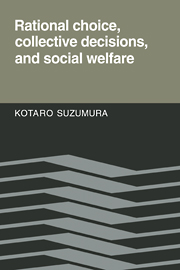Book contents
- Frontmatter
- Contents
- Preface
- Chapter 1 Prologue
- Chapter 2 Rational choice and revealed preference
- Chapter 3 Arrovian impossibility theorems
- Chapter 4 Simple majority rule and extensions
- Chapter 5 The fairness-as-no-envy approach in social choice theory
- Chapter 6 Impartiality and extended sympathy
- Chapter 7 Individual rights and libertarian claims
- Chapter 8 Epilogue
- Notes
- Bibliography
- Index
Chapter 8 - Epilogue
Published online by Cambridge University Press: 07 October 2011
- Frontmatter
- Contents
- Preface
- Chapter 1 Prologue
- Chapter 2 Rational choice and revealed preference
- Chapter 3 Arrovian impossibility theorems
- Chapter 4 Simple majority rule and extensions
- Chapter 5 The fairness-as-no-envy approach in social choice theory
- Chapter 6 Impartiality and extended sympathy
- Chapter 7 Individual rights and libertarian claims
- Chapter 8 Epilogue
- Notes
- Bibliography
- Index
Summary
[L]et not then my readers imagine that I dare flatter myself with having seen what I think is so difficult to discover. I have opened some arguments; I have risked some conjectures; but not so much from any hopes of being able to solve the question, as with a view of throwing upon it some light, and giving a true statement of it. Others may with great facility penetrate further in the same road, but none will find it an easy matter to get the end of it.
Jean-Jacques RousseauIn concluding this study, a few general observations that might shed further light on the nature of our problem may be in order. We would also like to add some qualifications on the analysis presented in this work.
Many reputable welfare economists have been strenuously denying the relevance of Arrovian impossibility theorems to welfare economics. Some of them have gone as far as to purge social choice theory altogether from the sacred realm of economics. Although we are in full agreement with Arrow's response (1963, p. 108) to the effect that “one can hardly think of a less interesting question about [Arrow's] theorem than whether it falls on one side or another of an arbitrary boundary separating intellectual provinces,” the reason for which Arrow's result has been denied any legitimacy in welfare economics is worth our examination, which seems to bring about an important clarification.
- Type
- Chapter
- Information
- Rational Choice, Collective Decisions, and Social Welfare , pp. 239 - 242Publisher: Cambridge University PressPrint publication year: 1983



